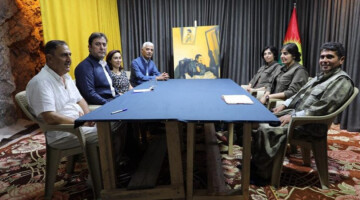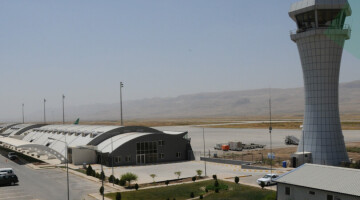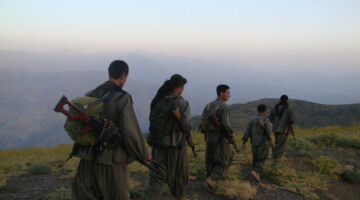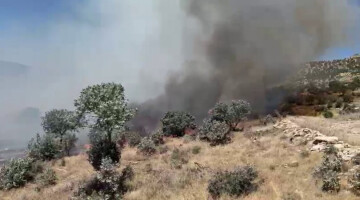The Press Center of the People's Defense Forces (HPG) has issued a statement on four guerrillas who fell in North Kurdistan. According to the statement, Xebat Cûdî and Zamani Amanos were killed in an air raid by the Turkish army in the Kêla Memê area of Botan on 17 August.
After their deaths, the area continued to be intensively bombed by fighter jets and helicopters, then ground troops were deployed and fighting broke out. Guerrilla commander Serhed Jêhat and the fighter Yılmaz Dersîm died on 18 August after clashes that lasted for hours when the Turkish air force bombed their base again and they used their last ammunition on themselves to avoid being taken prisoner alive.
The HPG paid tribute to the martyrs as Kurdistan revolutionaries who were willing to make sacrifices and who fought for the freedom and existence of their people until the last moment of their lives. Their unconditional militant attitude was a model for further struggle, and their memory would live on. The HPG expressed its condolences to the relatives and the Kurdish people. In the statement, the HPG provided the following information about the identities and biographies of the martyrs:
 Code name: Serhed Jêhat
Code name: Serhed Jêhat
First and last name: Veysel Sevinç
Place of birth: Agirî
Names of mother and father: Melek – Abdulgafur
Date and place of death: August 18, 2024 / Botan
 Code name: Yılmaz Dersîm
Code name: Yılmaz Dersîm
First and last name: Barış Kartal
Place of birth: Şirnex
Names of mother and father: Fatma – Abdullah
Date and place of death: August 18, 2024 / Botan
 Code name: Xebat Cûdî
Code name: Xebat Cûdî
First and last name: Reşit Çevik
Place of birth: Şirnex
Names of mother and father: Saadet – Müslüm
Date and place of death: August 17, 2024 / Botan
 Code name: Zamani Amanos
Code name: Zamani Amanos
First and last name: Serhat Güzel
Place of birth: Mêrdîn
Names of mother and father: Mülkiye - Ömer
Date and place of death: August 17, 2024 / Botan
Serhed Jêhat
Serhed Jêhat was born in Agirî-Panos and grew up in a Kurdish village untouched by state influences until he started school. His family taught him the basic principle of always striving for the good, the right and the beautiful in life. This attitude shaped his entire life.
At school, a foreign language and culture were forced on him and he was expected to declare his Turkishness. That was his first confrontation with the Turkish state. When he later moved to a Turkish city to work, he became even more aware of the hostile attitude towards Kurds.
At the same time, the Kurdish liberation struggle had an impact on his life. His family and close relatives sympathized with the freedom movement and Serhed Jêhat began to read analyses by Abdullah Öcalan and to engage with colonialism in Kurdistan.
He joined the guerrillas with his relatives Jêhat Agirî (Erhan Serhat) and Serxwebûn Jêhat (Sinan Serhat). The two relatives later fell as martyrs. Due to various circumstances, they were unable to join at the same time, but Serhed Jêhat kept his promise and followed his relatives into the mountains on 15 August 2005. He viewed this step as a conscious rebirth, with which he returned to his true identity, rejected capitalist modernity and adopted the ideology of a free life. He took part in basic training in Xakurke and stayed in the region for two years.
After that, he spent two years in the Şehîdan area. After a stay at the central party school in the mountains, he fought in Botan and assumed responsibilities at command level. In 2016, he was injured in an enemy attack and was receiving medical treatment in the Medya Defense Areas. After his recovery, he was back in Botan. In 2019, he undertook further training and was then appointed to the regional command of Xakurke. During his last deployment in Botan, he was faced with the option of being injured and taken prisoner by the enemy or dying as a self-sacrificing militant in the fight for freedom. "Our comrade Serhed went down in history with his fight and his death as one of the great heroes of the Fedai guerrilla," said the HPG.
Yılmaz Dersîm
Yılmaz Dersîm was born in Şirnex-Silopiya and belonged to the Sipêrtî tribe. His family was close to the Kurdish liberation movement and many people from his environment joined the PKK. He grew up aware of his Kurdish identity and developed a political attitude at an early age. His childhood was shaped by the war in Kurdistan and the oppression by the Turkish state. He only went to school for a short time because he was not allowed to speak his native language. At a funeral of fallen guerrilla, he swore revenge. In 2013, he went to the mountains in his home region of Botan and joined the freedom struggle. He received basic training in the Medya Defense Areas and developed quickly.
Life in the mountains was not difficult for him. With his enthusiasm and disciplined way of working, he was able to help his fellow fighters with many questions. In practice and further training, he became an ideologically equipped fighter with military expertise. He was aware of his responsibility as a freedom fighter for his people and was ready to make any sacrifice. Therefore, he was constantly looking for ways to deal a heavy blow to the enemy.
In Kêla Memê he fought until the last bullet, which he kept for himself so as not to be captured alive.
Xebat Cudi
Xebat Cûdî was born in Şirnex and grew up with the culture of resistance for which Botan is known. As a child, he became aware of his Kurdish identity. His mother told him about the actions of the Turkish state in the 1990s, when thousands of villages in Kurdistan were burned down and people were expelled using brutal methods.
After the massacres of the population during the resistance for self-government in North Kurdistan, he decided to take up armed struggle and went to the mountains in Garzan in 2016 to join the guerrillas. There he learned the first basic skills for guerrilla warfare, and came to the Medya Defense Areas for in-depth training. Because he won the trust of his comrades with his mature personality and his strong connection to the freedom movement, he was soon given important tasks, which he fulfilled continuously and successfully for a long time.
He devoted himself intensively to the philosophy of Abdullah Öcalan and continued his military training. At his own request, he eventually returned to Bakur, where he was killed in an enemy attack in Kêla Memê on 17 August.
Zamani Amanos
Zamani Amanos was born in Mêrdîn-Dêrik and spent his childhood in Riha-Weranşar. He grew up in a politicized environment and knew the PKK as a child.
The war in Kurdistan and in particular the scorched earth policy and extra-legal executions in the 1990s showed him the reality of the Turkish state. Due to the denial of Kurdish identity, he basically spoke his mother tongue Kurmancî to protect himself. In addition to school, he worked to help support his family.
During his studies, he became active in the Kurdish youth movement. He studied civil engineering in Iskenderun and had the prospect of a materially well-provided life, but he preferred a free life in the PKK movement. In the following period, he took on tasks in various places in North Kurdistan and worked conspiratorially in the YPS structures. For this, he was arrested and spent five years in prison.
He took advantage of this time and left prison as an ideologically mature and equipped apoist militant. His release came at a time of intense attacks on the Kurdish movement, and Zamani went to the mountains. In the guerrillas, his fellow fighters were able to benefit from the knowledge he had acquired in prison. He went through an intensive training phase and became a professional guerrilla. Knowing that the PKK's struggle is based on selflessness and sacrifice, he went to Bakur on his own suggestion.
In Kêla Memê, he joined the caravan of the martyrs during an enemy attack on 17 August, according to the HPG.

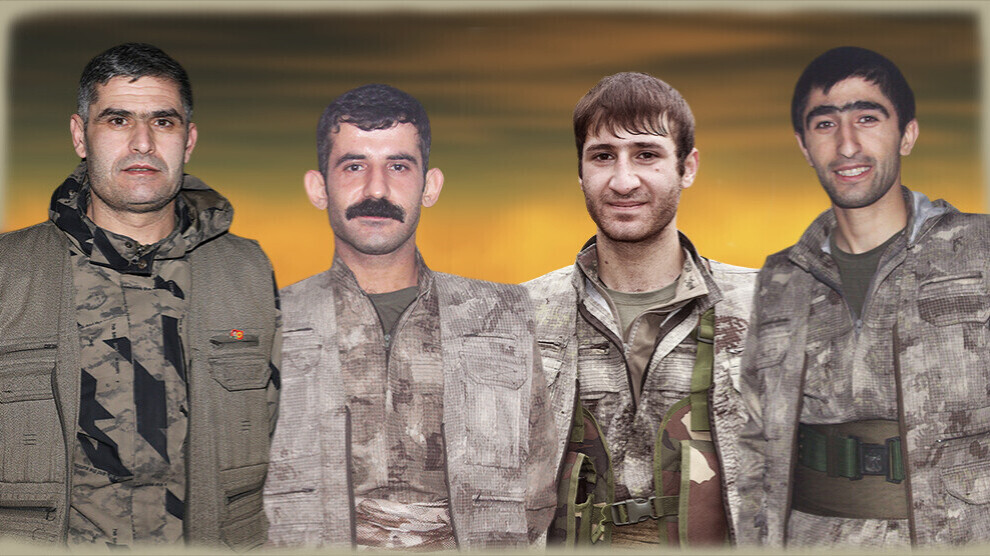
 Code name: Serhed Jêhat
Code name: Serhed Jêhat Code name: Yılmaz Dersîm
Code name: Yılmaz Dersîm Code name: Xebat Cûdî
Code name: Xebat Cûdî Code name: Zamani Amanos
Code name: Zamani Amanos







